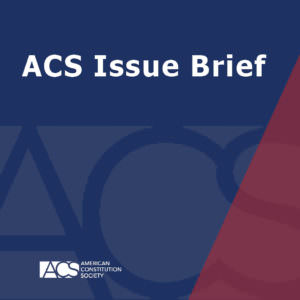Oklahoma State Question 755 and An Analysis of Anti-International Law Initiatives
University Distinguished Professor at Northeastern University Law School of Law
January 11, 2011
 ACS is pleased to distribute “Oklahoma State Question 755 and An Analysis of Anti-International Law Initiatives,” an Issue Brief by Martha F. Davis, Associate Dean for Clinical and Experiential Education and Professor of Law at Northeastern University Law School, and Johanna Kalb, Assistant Professor of Law at Loyola University New Orleans College of Law. This paper is being released amidst ongoing legal and public debate about Oklahoma's Question 755, a ballot initiative that amended the state constitution in an attempt to bar state and municipal courts from considering international or Sharia law when making judicial decisions. The amendment has currently been enjoined as a result of federal court litigation on First Amendment grounds, and an appeal has already been filed. This Issue Brief moves away from the specifics of the litigation over Question 755 and considers the broader context of the legal and policy issues raised by anti-international law initiatives. Professors Davis and Kalb briefly outline the history of these initiatives and explore possible underlying motivations, including the perceived need to defend Christian values, concern about state/federal sovereignty, fear of judicial activism, and belief in American exceptionalism. Having explored the varying motivations behind these proposals, the authors then explain why they find these proposals to be problematic, arguing that they: undermine federalism; harm state and local governments, businesses, and individuals operating in a global economy; and corrode the independence of state judiciaries. Professors Davis and Kalb conclude by cautioning the supporters of Question 755 and similar initiatives, stating:
ACS is pleased to distribute “Oklahoma State Question 755 and An Analysis of Anti-International Law Initiatives,” an Issue Brief by Martha F. Davis, Associate Dean for Clinical and Experiential Education and Professor of Law at Northeastern University Law School, and Johanna Kalb, Assistant Professor of Law at Loyola University New Orleans College of Law. This paper is being released amidst ongoing legal and public debate about Oklahoma's Question 755, a ballot initiative that amended the state constitution in an attempt to bar state and municipal courts from considering international or Sharia law when making judicial decisions. The amendment has currently been enjoined as a result of federal court litigation on First Amendment grounds, and an appeal has already been filed. This Issue Brief moves away from the specifics of the litigation over Question 755 and considers the broader context of the legal and policy issues raised by anti-international law initiatives. Professors Davis and Kalb briefly outline the history of these initiatives and explore possible underlying motivations, including the perceived need to defend Christian values, concern about state/federal sovereignty, fear of judicial activism, and belief in American exceptionalism. Having explored the varying motivations behind these proposals, the authors then explain why they find these proposals to be problematic, arguing that they: undermine federalism; harm state and local governments, businesses, and individuals operating in a global economy; and corrode the independence of state judiciaries. Professors Davis and Kalb conclude by cautioning the supporters of Question 755 and similar initiatives, stating:
What the proponents of the amendment fail to acknowledge, however, is that it is impossible to bar judicial 'consideration' of any source -- particularly when . . . international law is relevant to the dispute. If anything, the amendment forces judges and justices to be less transparent in their reasoning or (if they try to abide by the strict letter of the provision) to reach incorrect decisions. And as unlikely as these provisions are to promote their intended goal, the consequences of these sorts of measures for Oklahoma and for the nation are severe. The federal government's capacity to protect American citizens and businesses on the international stage is directly related to its ability to guarantee our nation's reciprocal compliance. Oklahoma's action threatens our national commitment to honoring our international obligations and undermines the states' ability to work cooperatively with the federal government to implement them.
Read the full Issue Brief here: Oklahoma State Question 755 and An Analysis of Anti-International Law Initiatives
